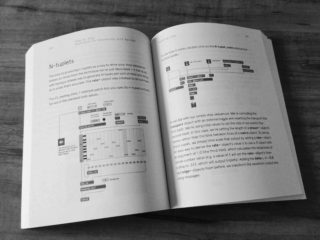 Cycling ’74 has published a new book, Step by Step: Adventures in Sequencing with Max/MSP.
Cycling ’74 has published a new book, Step by Step: Adventures in Sequencing with Max/MSP.
The book, by author Gregory Taylor, explores building basic step sequencers in Max – and then moves on to developing more advanced sequencers, tailored to the way that you make music.
“Gregory is a brilliant communicator and his tutorials are always super clear and accessible, and have been invaluable over the years to both us and the wider Max community,” says Autechre’s Sean Booth. “Many of the techniques explored here will be useful to anyone using Live, M4L, or just interested in expanding their Max sequencing capabilities.”
Summary:
Step sequencers for electronic music are both widely loved and wildly diverse – they offer a simplified approach to composition and performance that can be the basis for personal music-making. Nearly everyone has a “favorite” step sequencer they know and love, and nearly everyone also has a few ideas to improve upon them.
Using the Max visual programming language, author Gregory Taylor starts with a tour of a simple step sequencer patch and then builds upon the original patch piece by piece, providing the recipes for over a dozen variations that range from the simple tweak to the profoundly deep whose parts can be recombined to produce even more variations.
In doing so, he presents Max as the perfect toolkit for creating these addictive devices, and give the reader a glimpse of how you can think with and work with the software.
Pricing and Availability
Step by Step: Adventures in Sequencing with Max/MSP is available via Amazon for US 24.95.

Wow, he got a blurb from Sean Booth!
Never seen that before.. can’t wait to see what the old G-Man’s cooked up here.
Has anyone seen a list of the type of sequencers covered here? For example are they all sort of linear mono or are there more esoteric generative examples?
The blurb from Sean Booth makes me hope for some interesting examples but I don’t see any info on the content, would be great if they posted a image of the contents page.
I would say the emphasis is on having a rock solid understanding of the pieces and concepts that will help you create your ideal step sequencer. Probability, Density, Drunkenness, Euclidean and Polyrhythmic techniques are all discussed.. but it’s up to you to create lets say emergence from an iterated function system ala AE or Max Cooper